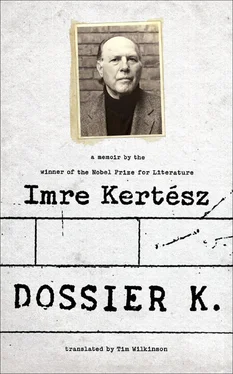For my part, though, I hope we shall learn something about this in the end. You mentioned Logodi Street, which suggests that you were no longer living with your mother in Zivatar Street .
No, my mother married the glass engineer, who had in the meanwhile been promoted to managing director of the factory.
For political reasons or engineering know-how?
I suppose it was as a reward for all his inventions; he wasn’t interested in anything besides vacuum tubes. My mother, on the other hand, was finally able to live in the style she had dreamed about since her girlhood. There was a car that went with the position, and at weekends they would go off on shoots for game, have a pig slaughtered in autumn for the hams and sausages … and as a result of some property deal they swapped the Zivatar Street apartment over my head.
Effectively, put you out on the street?
Only in principle; in practice they arranged a subtenancy for me “on a friendly basis” as the main tenant was some sort of senior employee at the factory that my stepfather managed.
In other words, more through bribery than “on a friendly basis” …
That’s quite possible, as we settled on a ridiculously low rent; but the main thing was that it was a rather neat room at the foot of Buda Castle Hill, with my window overlooking the dense leafage of a tree. Since this meant we were finally free of each other, the endless wrangles with my mother also grew less common.
What were the wrangles about?
Look, I’ve already told you that in matters of no direct concern to her my mother suffered from outright colour-blindness. Both she and her husband pretended that we were living in a slightly wacky but otherwise completely normal world, in which a young person’s duty is to attend to their advancement and build a career. This was the summer of 1951. Every night, toward dawn, operatives of the State Security Office, the ÁVH, would go around the city loading onto trucks and transporting to their forced places of residence those people who had been sentenced to resettlement.
You mentioned earlier Iván Mándy’s book , Lecturers and Co-authors …
Yes, and that too was part of the total absurdity. At that time I was part of a small group of friends who would write humorous sketches and short radio plays, all kinds of nonsense, for the insatiable Hungarian Radio. We would take apart the elements of the plays of Ferenc Molnár in various dives and espresso cafés, quite convinced that we would soon become famous comedy writers.
In Fiasco there is a scene where Köves, getting on for daybreak, is making his way homeward along deserted streets and is hailed by a strange chap from a bench by the footpath …
The pianist, who didn’t dare go home, because he wanted to avoid being dragged away from his bed.
Is the pianist a figure you dreamed up, or is he someone you encountered in real life?
I could even tell you his name.
That scene, as it happened, you also wrote as a stand-alone short story under the title “The Bench,” which contains a very typical sentence about the nonexistent identity that you spoke of before. It runs: “In those days I could always be persuaded by anything if I came up against the necessary patience or robustness.”
That is probably how it was in fact.
I rather feared as much. What, then, did it take for you to come to your senses from this, as it were, semidetached state?
Maybe by first getting fully immersed in it, then, later on, simply recalling it and being duly astonished by it.
As if by means of a time machine, you were to arrive at an unfamiliar — or perhaps familiar — place and uneasily watch what is happening to you?
If you’re referring to the second part of Fiasco , then you’re on the wrong track. Köves knows exactly what is going to happen to him; indeed, he himself provokes the events.
He is tormented by a Kafkaesque guilty conscience and forebodings .
Not at all. I know that an interpretation along those lines was printed in a German newspaper …
Which claims that you are trying to amplify on Kafka, raising the question of whether that is in fact possible .
That’s not the point; the real issue is whether it is possible, in certain circumstances, not to amplify on Kafka. And here I don’t mean Kafka’s incomparable genius, but the fact that history has vindicated Kafka, and that has left its mark on the literature of succeeding generations. The language of the second part of Fiasco caused me quite a headache, i.e., how it is possible to cast the ephemeral ideological constructs of merely transitory closed regimes and dictatorships into the more durable form of a novel. I was looking for a usable metaphor, and it finally occurred to me that totalitarian dictatorships, including the Stalinist one, speak in the language of religion. Nor can it be otherwise, since their world was not a realm of logic but of the absurd. As a result, therefore, a degree of Kafkaesque stylization seemed glaringly obvious, for one thing because Fiasco ultimately deals with something entirely different from Kafka’s marvellous novels; for another thing, because what else is the intellectual domain that we call literature other than the handshaking of writers with one another ad infinitum ? But that would take it too far. As far as Fiasco is concerned, it is a novel based on a fundamentally amusing notion. A writer bogged down in the intellectual swamp of the Seventies, the Brezhnev era, awakes to the realization that he is working counter to his own interest, because a creative life cannot be squared with the time in which he is living. That is when he embarks on a novel, which is nothing more than a process of the recapitulation of a fate: episode by episode, he recreates the existence of his young alter ego , Köves, looking more and more for where he lost his way, why he couldn’t disappear, submerge, into the anonymous mass of history. He is unlucky, however, and at the end of the book comes to the very same point — the L-shaped corridor — where he was once overtaken by his creative vision: the creative life proves to be an inescapable curse, its end product failure — the fiasco.
It may well be that I am lacking something in the humour department when it comes to this, but I can now clearly see that the plot of the novel-in-the-novel which is “Fiasco” is not in the least the dream parable that it is usually interpreted as being .
I could only give a response if I knew what, precisely, you think of as a “parable.” Can you give an example?
Offhand, Orwell’s Nineteen Eighty-Four comes to mind as being a true parable .
In that case, Fiasco cannot be one. It contains a different ratio of fiction and real life. Or rather, if one wants to see it as a parable, then it’s not a very good one. But there are other genres that Fiasco also does not belong to. To be brief and parabolic myself: it is not appropriate to use a nutcracker to peel a peach.
Witticisms aside, obviously what you want to say is that the novel should be approached from the point of view of its own originality .
Everything should be approached from the point of view of its own originality.
Despite the fact that it is no simple task to get to grips with Fiasco: it is surrounded by as many defensive systems as a fortification. The moment you have managed to struggle past one you find yourself face-to-face with another. You have to fight your way past one parenthesized barbed-wire fence after another, past ever newer crevasses of novels-within-novels … until it finally dawns on you that that is exactly what the novel is about: intellectual brackets and mental barbed-wire entanglements. Am I assessing that correctly?
Читать дальше












